Curated OER
Using Math to Get to the Source
For this lead blood levels worksheet, students use mathematics to determine the source of lead poisoning in children. They are given data, they analyze the data and they graph the blood level measurements vs. the mean blood lead level in...
Lane Community College
Review Sheets: Basic Mathematics 1
Here is a worksheet that is 3/4 fraction practice and 1/4 skills guide. The problems are organized by concept and each section bullet points the skills needed to accomplish them. The problems are straightforward practice with word...
Curated OER
Visualizing Multiplication
Upper graders represent multiplication of a two-digit number by a two-digit number as the area of a rectangle with dimensions of the two factors. They find patterns for the number of different base ten blocks in a rectangle representing...
Mathalicious
On Your Mark
With many factors leading to a great athlete, does height make Usain Bolt unfairly fast? Middle schoolers conduct analysis to change the running distance of the Olympic races to be proportional to the height of the participants. They...
Houghton Mifflin Harcourt
Counting the Zeros
This handout is a terrific teaching tool when covering the powers of ten and moving decimal points to multiply and divide large numbers. The first half of the assignment covers multiplication and then gives learners a try. The second...
Mathalicious
Pic Me!
Finally! Math and Instagram have come together to discuss the correlation between likes and followers. High schoolers can't help but want to discover what makes one account more popular than another by developing a line of best fit and...
Curriculum Corner
Fraction Brochures
Make fractions fun and interesting by using a brochure form. Young mathematicians practice and gain a better understanding of how to add and subtract fractions, simplify fractions, and find LCD (least common denominator). The resources...
EngageNY
Simplifying Square Roots
Explore the process of simplifying square roots through an analysis of perfect squares. The fourth lesson of 25 expects individuals to find the perfect square factors in each radicand as a means of simplifying. The perfect square factor...
EngageNY
Distributing Expressions
You know how to factor expressions; now it's time to go the opposite way. Scholars learn to write algebraic expressions in expanded form using the distributive property. A problem set helps them practice the skill.
EngageNY
How Do Dilations Map Angles?
The key to understanding is making connections. Scholars explore angle dilations using properties of parallel lines. At completion, pupils prove that angles of a dilation preserve their original measure.
Mathematics Assessment Project
Solving Linear Equations
Linear equations are the focus of activities that ask learners to first complete a task that involves interpreting algebraic expressions and solving linear equations. They then take part in a card activity matching equations, situations,...
Massachusetts Department of Education
Similarity through Transformations
Create the ultimate miniature golf course. The 93-page model curriculum unit from the Massachusetts Department of Elementary and Secondary Education contains nine lessons on understanding similarity in terms of both Euclidean geometry...
EngageNY
Equivalent Ratios II
What is the connection between equivalent ratios? Class members first find the multiplication factor used to create equivalent ratios. Next, they take that information to determine whether ratios are equivalent. The second instructional...
Curated OER
Prime Factors
In this prime factors worksheet, students solve and complete 20 different problems related to prime factors of various numbers. They determine the factors for each given number by multiplying various numbers together to get another number.
Curated OER
Factoring Trinomials
In this Algebra I/Algebra II worksheet, students factor by pulling out the greatest common factors and factor trinomials in which the lead coefficient is one. The one page worksheet contains thirteen free response questions. Answers...
Curated OER
Fraction Fun
Students define properties of fractions and solve for them. In this algebra lesson, students rewrite fractions from mixed numbers to improper fractions. They reduce fractions using the GCF and convert the denominators correctly when...
Curated OER
Building Venn Diagrams
Young scholars use Venn diagrams to solve prime number and factorization problems. In this multiplication lesson, students watch a video and use a Venn Diagram to help them solve a pizza math activity that uses prime factorization. Young...
Curated OER
Add Fractions With Like Denominators (E)
For this adding fractions worksheet, students use their math skills to solve 14 problems that require them to add fractions with like denominators.
Curated OER
Add Fractions With Like Denominators (D)
In this adding fractions worksheet, students use their math skills to solve 14 problems that require them to add fractions with like denominators.
Curated OER
Add Fractions With Like Denominators (I)
In this adding fractions worksheet, students use their math skills to solve 14 problems that require them to add fractions with like denominators.
Curated OER
Add Fractions with Like Denominators [J]
In this fraction worksheet, students complete a total of 14 problems, adding fractions with like denominators. A sample problem is done at the top of the page.
Curated OER
Add Fractions With Like Denominators [H]
In this fraction learning exercise, students complete a total of 14 addition problems, adding fractions with like denominators. A sample problem is completed for students.
Curated OER
MS Math Multiplying Fractions
Students investigate the concept of fractions using the application of a word problem. The concept is taught by giving a word problem that needs to be solved. The lesson requires strong reading comprehension and logical thinking skills.
Curated OER
Factoring Polynomials
In this factoring polynomials instructional activity, 9th graders solve and complete 20 different problems. First, they identify the GCF of each polynomial. Then, students divide the GCF out of every term of the polynomial. Finally, they...






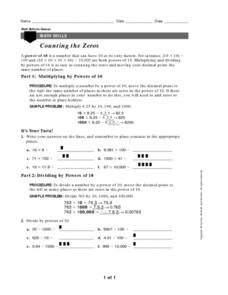



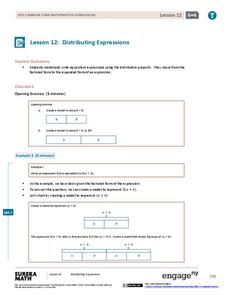







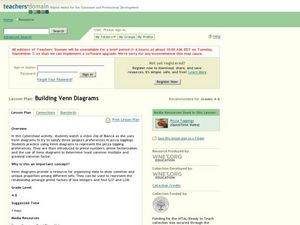
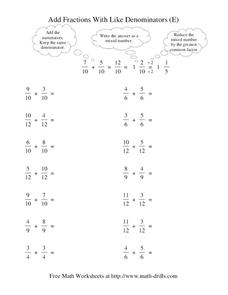

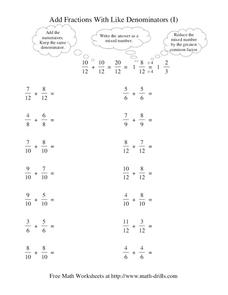
![Add Fractions with Like Denominators [J] Worksheet Add Fractions with Like Denominators [J] Worksheet](http://content.lessonplanet.com/resources/thumbnails/217926/large/nziymzyxlmpwzw.jpg?1315013932)
![Add Fractions With Like Denominators [H] Worksheet Add Fractions With Like Denominators [H] Worksheet](http://content.lessonplanet.com/resources/thumbnails/217927/large/nziymzyylmpwzw.jpg?1315013931)

